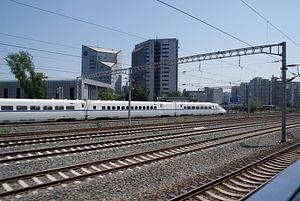Well, that didn’t take long.
A day after Thailand’s transport minister Arkhom Termpittayapaisith said that Bangkok was postponing a railway deal with China, Thailand’s deputy prime ministers, Prawit Wongsuwon and Somkid Jatusripitak, said the deal would go ahead as scheduled. Sure enough, on Thursday China and Thailand held a signing ceremony for a document outlining the framework for intergovernmental cooperation on the railway project.
As The Diplomat has reported previously, the railway project, worth roughly $9.7 billion, would see China construct two new rail lines in Thailand, covering a total of 867 kilometers. That deal was first announced last December, when Chinese Premier Li Keqiang was visiting Thailand. Alongside the railway agreement, China also agreed to buy two million tons of rice and 200,000 tons of rubber from Thailand.
It was the rubber deal that reportedly caused a snag in the railway agreements, according to Arkhom. He said that China had asked to change the conditions of the rubber deal, upsetting Bangkok and supposedly putting a hold on the signing of the railway agreement scheduled for December 3.
Deputy Prime Ministers Prawit and Somkid both refuted that report in remarks to the Bangkok Post. Prawit in particular said that the signing would go forward, although he added that some details are still subject to further negotiations, hinting at minor disagreements that remain. Prawit emphasized that both China and Thailand must benefit equally from the deal.
Arkhom and Wang Xiaotao, the deputy head of China’s National Development and Reform Commission, signed the railway agreement on Thursday, at the ninth meeting of the Joint Committee on Railway Cooperation. The agreement calls for China and Thailand to set up a joint venture to control the investment and eventual operation of the railway. China pledged to provide financing, technology transfer, and personnel training to Thailand as part of the railway deal. According to Xinhua, the new rail lines will reach speed of up to 180 kilometers per hour.
Beijing views the railway as part of its larger efforts to increase inter-connectivity between its southern provinces and the countries of Southeast Asia – a sub-project of the larger “Belt and Road” initiative that has emerged as China’s major foreign policy strategy under Xi Jinping. “As an important part of the trans-Asian railway network, the project will potentially reinforce Thailand’s position as a transport hub in the region and inject vitality into the economic development in the southwestern part of China,” Xinhua explained.
Alongside the railway agreement, deals on China’s purchases of rice and rubber were also inked on Thursday. According to Xinhua, Chinese companies pledged to purchase one million tons of rice and 200,000 tons of rubber from Thailand. The two countries are still in negotiations over a second rice deal that would fulfill the original pledge for China to purchase two million tons of rice.
Thai Commerce Minister Apiradi Tantraporn confirmed those deals, but told Bangkok Post that the parts of the rubber deal were still under negotiation. That points back to Arkhom’s comments, but apparently the disagreement wasn’t enough for China and Thailand to risk a high-profile delay of their railway project.
Arkhom told Bangkok Post that the ground-breaking ceremony for the railway will take place as schedule on December 19.

































